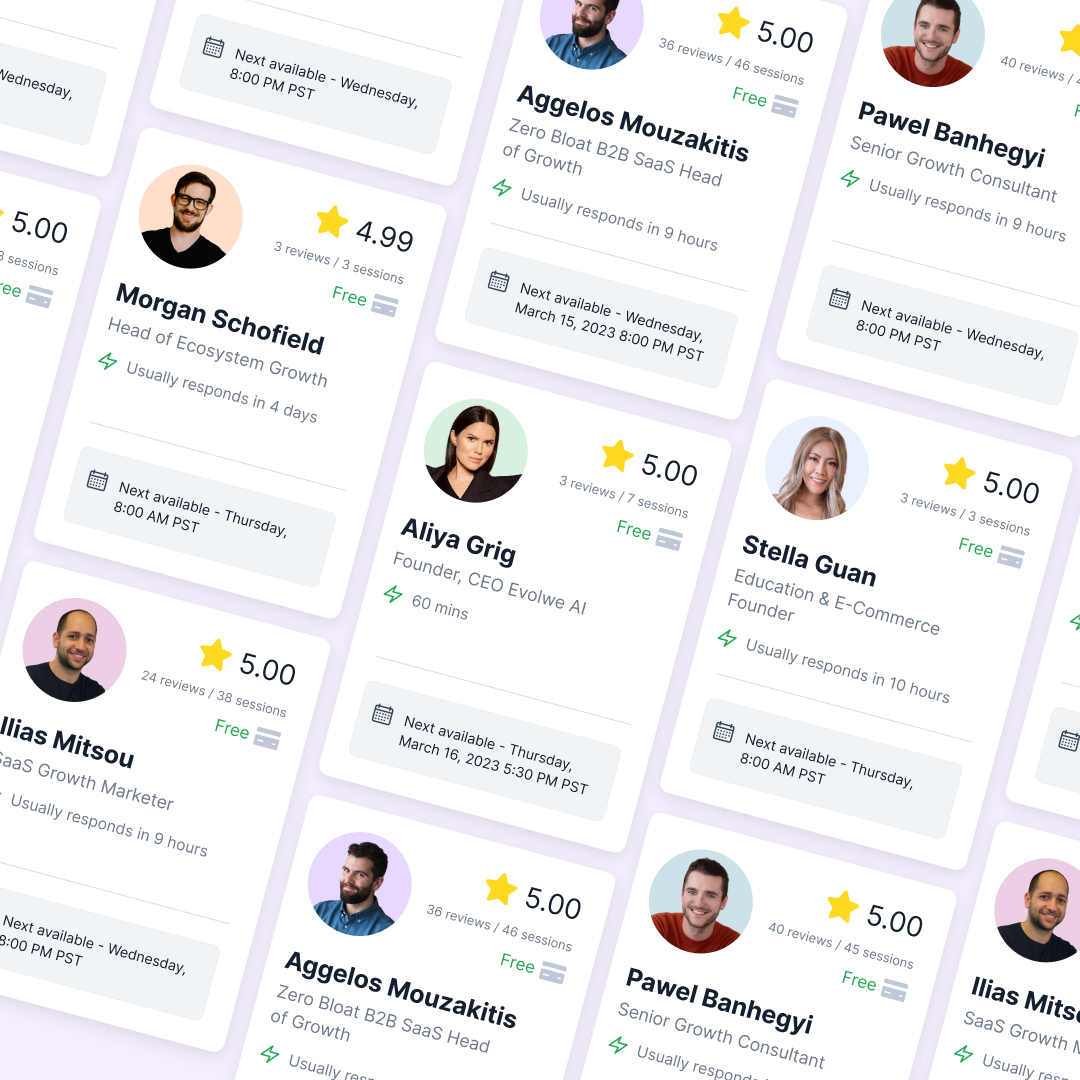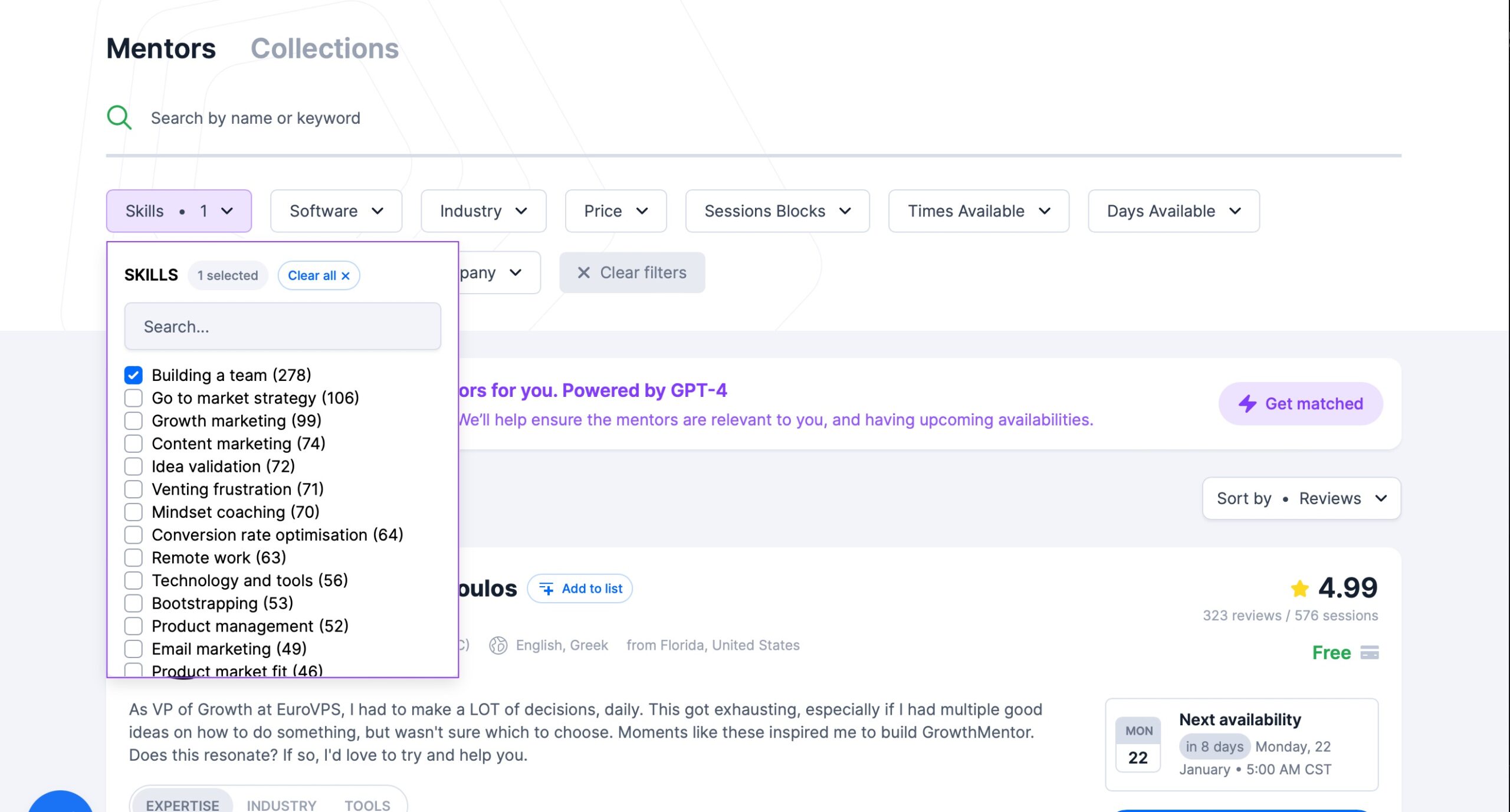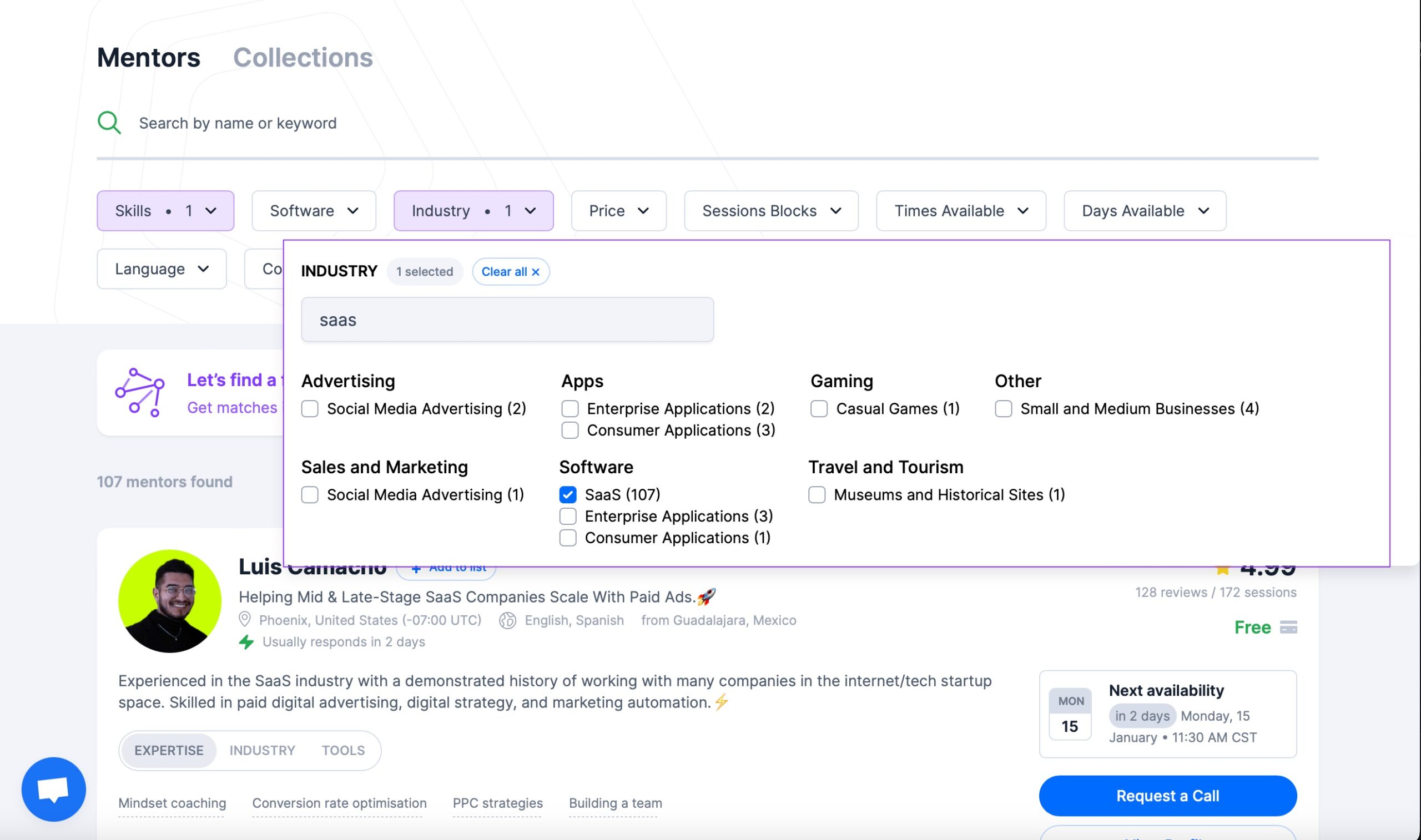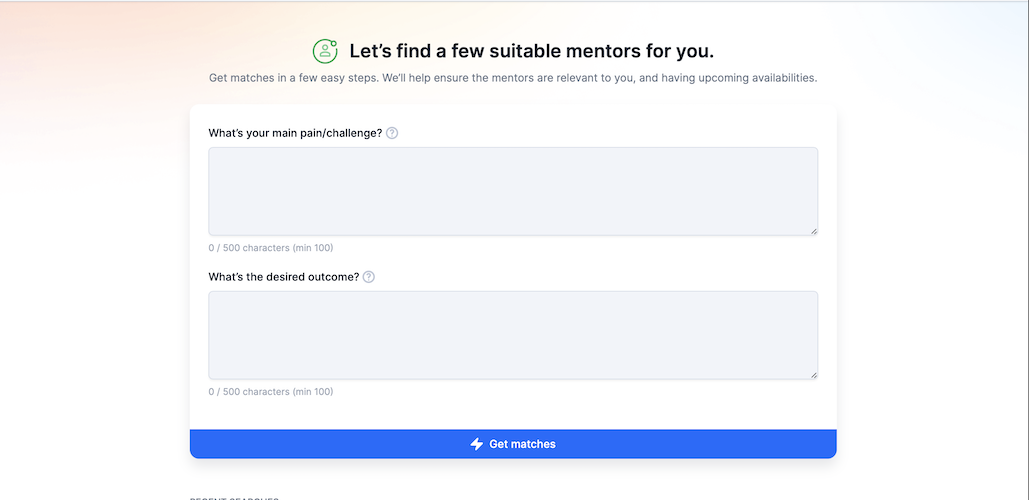98 Must-Ask Questions for Your Startup Mentor
First of all, congratulations! You’ve taken the first step towards giving your startup a huge boost.
But maybe you’re hesitant to get started because you’re not sure what questions to ask in a mentorship session.
Not to worry—we’ve got you covered. After matching thousands of mentees to mentors over the years, we know a thing or two about what questions are the most important. So we’ve gathered a list of 98 questions, organized by all the areas your startup may work on.
But before we get started on questions, let’s cover a bit about being a good mentee.
A Quick Primer on Being a Good Mentee
Being a good mentee comes down to a few main points, most of which center on preparation, respect, and keeping a growth mindset.
Before your session, make sure to prepare a list of questions or outline some form of agenda. You can send this to your mentor beforehand if you feel it’s appropriate, or simply use it as a way to guide your discussion. Do mind your available time and ensure you don’t try to pack too much into your session with your mentor.
Now, we’re sure this goes without saying, but take time to get to know your mentor. Do research before your session on their work and take a minute or two at the start of the session for a bit of introductory small talk. Because no matter how experienced or famous your mentor is, they’re just people too and will appreciate you went the extra mile to learn more about them.
Finally, keep an open mind throughout your discussion with your mentor. You want to listen and ask questions more than you make statements. And, though it can be difficult if you’re talking about sensitive topics, try to stay curious rather than defensive. Remember, your mentor is there to tell you what you need to hear, not necessarily what you want to hear. But, if you understand the advice is meant to help move your startup forward and consider it carefully, you can save yourself time and a ton of frustration.
With your mentee primer out of the way, let’s dive into questions you can ask your mentor! We’ve included a list of questions as well as recommended mentors you can chat with on each topic here at GrowthMentor if you join.
Questions to Ask Your Mentor…
About How to Get Customers
Customer and user acquisition can often be one of the hardest parts of the process for a startup to tackle, especially since it can involve marketing, sales, and product simultaneously. Get your mentor’s take on it. Ask these questions:
- How do I determine what channels might be most effective for my startup to acquire users?
- How do I balance the needs of working on the product vs. marketing the product in the early days?
- What metrics and key performance indicators (KPIs) do you usually use to evaluate the success of customer acquisition efforts?
- How do you approach targeting different market segments or niches to diversify customer acquisition channels?
- How can we best utilize customer feedback to improve our customer acquisition loops?
- How should our early stage startup balance short-term customer acquisition projects with long-term customer retention and loyalty?
- What are some cost-effective customer acquisition channels that you recommend for a startup with limited resources?
Our Mentor Recommendation for This Topic:

About PM Fit
After all, this is one of the biggest questions keeping founders awake at night. But a mentor can always help you find the way forward. Here are some of the questions to ask:
- How do you define and measure product-market fit, especially in the early days of a startup?
- Have you encountered situations where a pivot was necessary to achieve product-market fit, and if so, how did you navigate that decision?
- In the early stages, how do you balance staying true to your vision while remaining adaptable to market feedback and changes?
- What strategies do you recommend for validating product-market fit before scaling efforts?
- Have you ever experienced any challenges in achieving P-M fit? How did you navigate those challenges?
- When should I start looking at competitive analysis when it comes to achieving product market fit?
- In your experience, is building a strong brand necessary for a startup to achieve product market fit?
Our Mentor Recommendation for This Topic:

From PMF to Scale / Growth at companies from £1 to nearly £100million in revenue
About Finding Your ICP
Identifying your Ideal Customer Profile can be one of the most important first moves for an early startup. But it’s also sometimes one of the hardest, so why not get a mentor’s advice? Ask these questions:
- How important are demographics for identifying my ICP?
- In the case of B2B SaaS, how do you approach creating Ideal Customer Personas when dealing with multiple stakeholders within a potential customer organization?
- How can I validate whether my theories about our assumed ICP play out with our real-world market?
- What should I do when my team has multiple very different opinions regarding who our ICP is?
- What data and metrics should we look at to identify our ICP?
- Can you walk me through an example of an ICP you developed previously?
- How do you juggle the needs of your ICP with the roadmap features you need to prioritize?
Our Mentor Recommendation for This Topic:

Founder and CEO at Skief Labs (Growth & Outbound Agency)
About User Research
Because identifying your ICP, figuring out what to features to build, nailing your messaging, and so much more aren’t possible without a good user research program. But, it’s easier said than done. Here’s what to ask:
- We know user research can be important, especially before we’ve found PM fit. How can we prioritize and conduct user research with a limited budget?
- What difficulties have you run into when it comes to conducting user research?
- What are some of the most cost-effective routes for a startup like ours to recruit users for user research?
- What methodologies and techniques do you recommend for conducting effective user research in the early stages of a startup?
- How can you build a system that collects and organizes user feedback so it can be used efficiently, especially in the long term?
- How frequently should a startup engage in user research activities to stay closely aligned with user needs and preferences?
- What challenges should a startup anticipate when implementing a user research program, and how can these challenges be mitigated?
Our Mentor Recommendation for This Topic:

Customer Researcher & Marketer
About Improving Customer Experience
Your customer experience is often a make-or-break factor in the early stages, especially if you’re competing in a market with bigger, more established players. Here’s what to ask to get ahead:
- How focused should we be on improving customer experience in the early days?
- What strategies do you recommend for gathering feedback on the current state of customer experience and identifying areas for improvement?
- How should an early stage startup approach product personalization, especially on a limited budget?
- What strategies do you recommend for maintaining communication with customers post-purchase to gather ongoing feedback and ensure satisfaction?
- How do you ensure that customer feedback is kept out of a silo and effectively communicated to the product development team to drive continuous improvement?
- How does a startup ensure a consistent and positive customer experience as the business scales and the customer base grows?
- How do you approach addressing and resolving customer complaints or issues to turn negative experiences into positive ones?
Our Mentor Recommendation for This Topic:

Customer Experience Design & Marketing Specialist (Growth & Retention)
About Sales
Sales, especially if you’re focused on a sales-led-growth motion, isn’t a simple: “Start calling potential customers.” You have to be smart about it. But a good mentor can help you get ahead. Here are the things to ask:
- How can my startup establish a successful sales process without expending a large budget?
- What key metrics and performance indicators should a startup prioritize to measure the success of their sales efforts?
- Can you provide examples of successful sales strategies that have worked well for you and your team in the past?
- How do you ensure a smooth transition from the sales process to onboarding and customer success for a product?
- Will the price of our offering affect what sales strategies we can use?
- Can you share an example of a sales campaign that worked well for one of your startups?
- How do you stay informed about market trends and changes in customer needs to adapt the sales strategy accordingly?
Our Mentor Recommendation for This Topic:

Bootstrapper; Not your typical SaaS founder 💯
About Running Your Business Efficiently
Operations usually aren’t something startups start thinking about till later in the game. But if you can start early, you’ll also set yourself up for a much smoother path down the road. Ask your mentor these questions to get ahead:
- When should we put a focus on running the business effectively? Should we put processes in place from day one or wait until the startup has matured more?
- What key performance indicators (KPIs) should a startup monitor to gauge the efficiency of its operations?
- How do you create and maintain a culture of efficiency and productivity within the startup team?
- How can an early stage startup balance the need for agility with establishing processes and organization?
- What strategies do you recommend for effective communication and collaboration among remote or distributed teams?
- How do you balance cost efficiency with quality in an early stage startup?
- At what point do we need to consider hiring a dedicated chief operations officer?
Our Mentor Recommendation for This Topic:

Product & Growth Leader, Former Director @ Shopify
About Getting Funding
If you’re deciding between starting or continuing down the bootstrapping or VC route, you’ll want other opinions on your options. Talk to a mentor and ask these questions:
- What are our different options for getting funding? Do we have different avenues we can pursue within bootstrapping or in VC investing?
- How can I decide whether continuing to pursue bootstrapping/VC funding is a good option for my startup?
- What’s the best way for me to decide if joining an accelerator is worth it?
- How do you approach negotiating favorable terms and conditions with investors while maintaining a positive relationship?
- Can you share experiences related to successful fundraising rounds for SaaS startups, and any lessons learned from challenges encountered?
- What strategies do you recommend for building relationships with potential investors and creating a strong network within the investment community?
- For bootstrapping startups, what’s the best way to create a strong network that might lead to partnerships in the future?
Our Mentor Recommendation for This Topic:

Co-Founder
About Leading a Team
Leading a team is one of those skills that’s hard to learn unless you’ve done it. But it’s also very hard to do well, even for experienced leaders. So shortcut the frustration and learning curve by asking your mentor these questions:
- Can you share your experience with building a strong company culture that fosters collaboration, innovation, and a positive work environment?
- What advice do you have for a founder in terms of maintaining a healthy work-life balance while leading a startup team?
- How do we balance hiring needs with maintaining an agile team?
- What tactics do you recommend for building trust and credibility with team members, especially in the early stages of a startup?
- How do you balance between being approachable and maintaining authority as a leader within a startup team?
- In terms of delegation, what tasks and responsibilities should a founder prioritize versus those that can be delegated to team members?
- How do you approach performance evaluation and feedback to ensure continuous improvement and professional development within the team?
Our Mentor Recommendation for This Topic:

Fractional CMO & Growth Marketing Consultant | Founder & Consultant at Meetagata | Prev: Google, Groove, Piktochart
About Launching a Product
There’s nothing that tests a founder’s nerves quite like a product launch. But you can prepare yourself for some of the possible pitfalls ahead of time by chatting to your mentor about questions like these:
- Can you share an example of how to run a resource-efficient product launch?
- How do you approach addressing potential customer concerns or objections preemptively during a product launch?
- What strategies do you recommend for creating a compelling value proposition that resonates with the target audience during a product launch?
- Can you share insights on identifying the optimal timing for a product launch in a competitive market?
- Do we need to worry about getting major press coverage or PR prior to our product launch?
- How do we decide whether our product should be launched as a beta, a partial audience launch, or a full audience launch?
- How do you leverage digital marketing and social media to amplify the impact of a product launch?
Our Mentor Recommendation for This Topic:

No bull$hit advice for new SaaS founders perfect your 1st profitable Go-to-Market📈 Ex-Reuters: Launched in 10+ markets 🌏
About Validating Ideas
Ah, idea validation. It’s the one topic that’s roughly impossible to get a grasp of without hearing a second objective opinion. Luckily, your mentor can do just that. Ask them these questions:
- How do you approach validating new ideas or features within an established startup to ensure alignment with the overall business strategy?
- How important is rapid prototyping or minimum viable product (MVP) development when testing and validating new ideas within a product?
- Can you provide examples of successful idea validation processes that led to the successful implementation of new features or projects?
- How do you approach A/B testing or experimentation to assess the performance and user response to different variations of an idea?
- How do we get started with an idea validation process, especially considering limited funds and resources?
- How do you balance between addressing immediate customer needs and exploring innovative ideas that may shape the future of the product?
- How do you approach validating ideas for efficiency and scalability, ensuring they align with the startup’s long-term goals?
Our Mentor Recommendation for This Topic:

3x Founder and Start-up Mentor
About Pricing Strategies
Don’t be that founder that figures out pricing by throwing darts at a board and guessing. Get an expert take from a mentor so you know your pricing strategy is right. Ask questions like these:
- How do you approach setting the initial pricing strategy for a new product, considering both market conditions and the product’s value proposition?
- Can you share insights on the role of competitor pricing analysis in determining the optimal pricing model for a startup?
- How can we ensure our product’s model is a good fit for a certain pricing strategy?
- How often should a startup revisit and adjust its pricing strategy to adapt to changes in the market or product features?
- Can you provide examples of successful pricing experiments or adjustments that led to increased revenue and customer satisfaction?
- What role does perceived value play in determining pricing, and how can a startup effectively communicate and enhance the perceived value of its product?
- How do you balance between affordability for customers and maximizing revenue potential?
Our Mentor Recommendation for This Topic:

About Mindset
Staying realistically positive and cool-headed as a founder is tough. This isn’t a game for the easily ruffled either. Fortunately, you’re not alone and every founder has been through it before. Talk it out with your mentor by asking questions like:
- How do you manage the uncertainty that comes with running a startup?
- Can you share experiences related to maintaining optimism during periods of slow growth or challenges in the business?
- How do you approach learning from mistakes without letting them negatively impact your confidence or enthusiasm for the startup?
- How can you keep yourself from getting defensive when you get critiques or criticism?
- What practices have you found that are helpful for managing stress and founder anxiety or depression?
- What are some of the best ways to avoid burnout as a founder?
- How can you balance staying realistic about expectations for the future without lapsing into pessimism?
Our Mentor Recommendation for This Topic:

About Handling Stress and Your Health
If the founder is feeling unwell, the startup’s going to be unwell, too. We’re not fans of the hustle culture here at GrowthMentor because there’s a difference between working hard and working yourself into the dirt (or worse). But talking to a mentor can help you figure out where your line is. Ask these questions:
- What are the most important habits to maintain your mental and emotional resilience as a founder?
- How do you balance the need to get everything done with healthy habits like getting enough sleep, eating right, etc.?
- What are some best practices for managing overwhelm better?
- How can I ensure I keep a good work/life balance and don’t let the startup take over my entire life?
- What stress management practices have you found most useful in your startup career?
- How do you handle the emotional toll of setbacks or challenges in the startup journey to maintain mental health?
- How do you approach setting realistic expectations for yourself and managing the pressure of meeting entrepreneurial demands?
Our Mentor Recommendation for This Topic:

Growth Practitioner, Nonprofit Fundraiser, Yoga Teacher, Urban Farmer
How to Find A Startup Mentor Through GrowthMentor
So now that you’re armed with plenty of questions to ask your mentor, you’ve hopefully got the confidence to schedule a session with your mentor.
But what if you don’t already have one?
Well, this is exactly why GrowthMentor exists! Here’s how you can find a mentor on our platform:
First, you’ll want to visit the “browse mentors” page. You could just start scrolling.
But, since we have more than 600 mentors, you’ll want to narrow down your options first.
Within our mentor search, you can apply filters to search for mentors with specific skills, software expertise, industries, or current and former companies. There are 275 different software areas to filter by, 30 skill areas, 300 industries, and more than 100 mentor companies.
For example, let’s say you’re facing questions about building a team for a SaaS industry company and you want a mentor with experience in both of those areas. All you have to do is check “Team Building” under skills, for 278 mentors:
And then, after a quick search for “SaaS” under “Industries”, check that box to narrow your field down to 107 mentors:
We usually recommend applying no more than 2 filters at a time, as certain filters (such as a mentor’s previous or current company) can pinpoint fairly specific results.
But in some cases, your filters may still yield a fairly large pool of potential mentors, like our 107 SaaS mentors with team building experience above.
To focus your options even more, you can search for specific keywords in our general profile search. Within our “SaaS” and “Team Building” filters, a search for the keyword “app” produces 39 mentor options, a search for “founder” yields 47 options, and a search for “accelerator” produces 15.
From there, it’s just a matter of browsing your options and determining which mentor seems like the best fit for you.
However, sometimes you’re in the throes of decision fatigue and simply don’t have the time or energy to sort through even five or ten mentor options.
Situations like these are exactly why we built our new AI matching engine:
Simply describe your primary pain-point, add your desired outcome, and in a matter of minutes, you’ll be matched with three different mentors who will be a great fit to help with your challenge.
Then, it’s just a matter of booking your call and asking your questions.
So if you want the fastest way to talk to a huge pool of experienced, pre-vetted mentors, we recommend joining GrowthMentor.
Get All Your Startup Questions Answered








